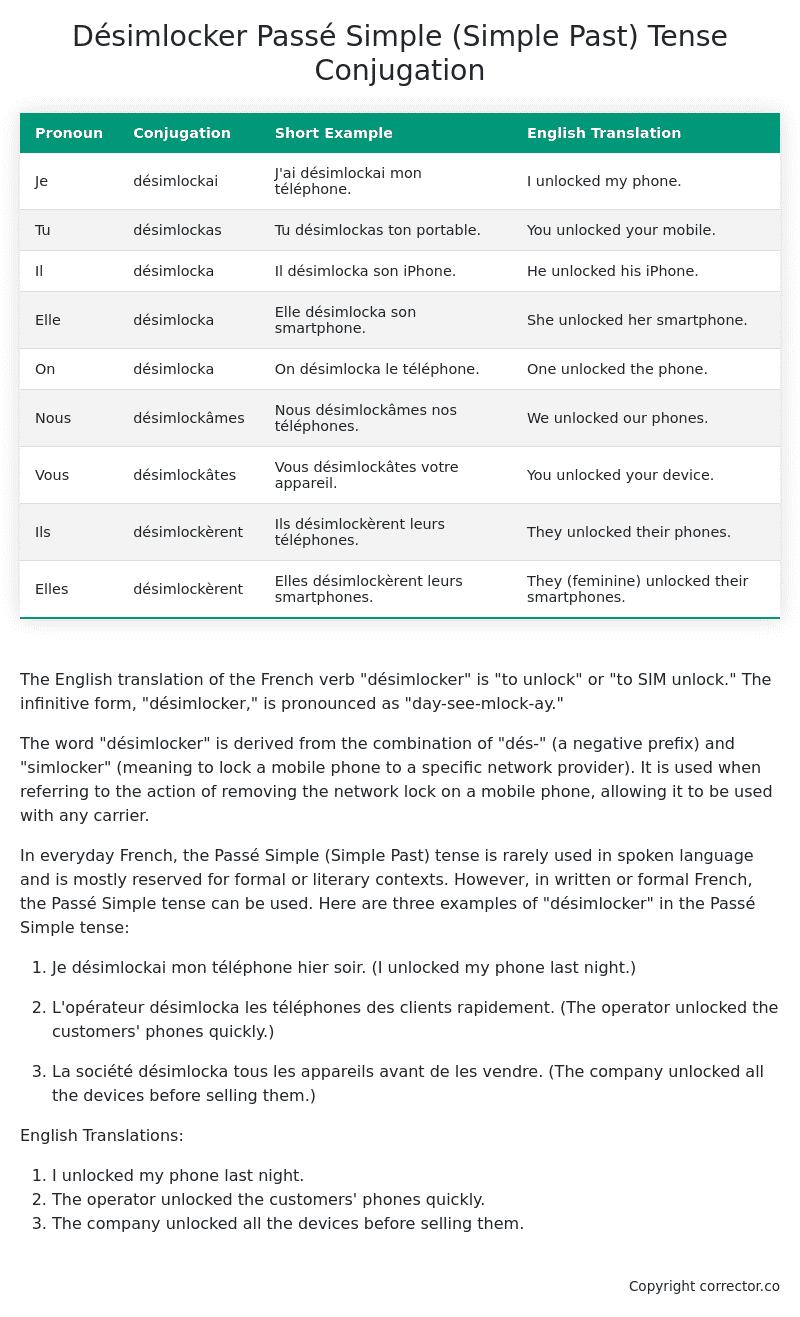Passé Simple (Simple Past) Tense Conjugation of the French Verb désimlocker
Introduction to the verb désimlocker
The English translation of the French verb “désimlocker” is “to unlock” or “to SIM unlock.” The infinitive form, “désimlocker,” is pronounced as “day-see-mlock-ay.”
The word “désimlocker” is derived from the combination of “dés-” (a negative prefix) and “simlocker” (meaning to lock a mobile phone to a specific network provider). It is used when referring to the action of removing the network lock on a mobile phone, allowing it to be used with any carrier.
In everyday French, the Passé Simple (Simple Past) tense is rarely used in spoken language and is mostly reserved for formal or literary contexts. However, in written or formal French, the Passé Simple tense can be used. Here are three examples of “désimlocker” in the Passé Simple tense:
-
Je désimlockai mon téléphone hier soir.
(I unlocked my phone last night.) -
L’opérateur désimlocka les téléphones des clients rapidement.
(The operator unlocked the customers’ phones quickly.) -
La société désimlocka tous les appareils avant de les vendre.
(The company unlocked all the devices before selling them.)
English Translations:
- I unlocked my phone last night.
- The operator unlocked the customers’ phones quickly.
- The company unlocked all the devices before selling them.
Table of the Passé Simple (Simple Past) Tense Conjugation of désimlocker
| Pronoun | Conjugation | Short Example | English Translation |
|---|---|---|---|
| Je | désimlockai | J’ai désimlockai mon téléphone. | I unlocked my phone. |
| Tu | désimlockas | Tu désimlockas ton portable. | You unlocked your mobile. |
| Il | désimlocka | Il désimlocka son iPhone. | He unlocked his iPhone. |
| Elle | désimlocka | Elle désimlocka son smartphone. | She unlocked her smartphone. |
| On | désimlocka | On désimlocka le téléphone. | One unlocked the phone. |
| Nous | désimlockâmes | Nous désimlockâmes nos téléphones. | We unlocked our phones. |
| Vous | désimlockâtes | Vous désimlockâtes votre appareil. | You unlocked your device. |
| Ils | désimlockèrent | Ils désimlockèrent leurs téléphones. | They unlocked their phones. |
| Elles | désimlockèrent | Elles désimlockèrent leurs smartphones. | They (feminine) unlocked their smartphones. |
Other Conjugations for Désimlocker.
Le Present (Present Tense) Conjugation of the French Verb désimlocker
Imparfait (Imperfect) Tense Conjugation of the French Verb désimlocker
Passé Simple (Simple Past) Tense Conjugation of the French Verb désimlocker (You’re reading it right now!)
Passé Composé (Present Perfect) Tense Conjugation of the French Verb désimlocker
Futur Simple (Simple Future) Tense Conjugation of the French Verb désimlocker
Futur Proche (Near Future) Tense Conjugation of the French Verb désimlocker
Plus-que-parfait (Pluperfect) Tense Conjugation of the French Verb désimlocker
Passé Antérieur (Past Anterior) Tense Conjugation of the French Verb désimlocker
Futur Antérieur (Future Anterior) Tense Conjugation of the French Verb désimlocker
Subjonctif Présent (Subjunctive Present) Tense Conjugation of the French Verb désimlocker
Subjonctif Passé (Subjunctive Past) Tense Conjugation of the French Verb désimlocker
Subjonctif Imparfait (Subjunctive Imperfect) Tense Conjugation of the French Verb désimlocker
Conditionnel Présent (Conditional Present) Tense Conjugation of the French Verb désimlocker
Conditionnel Passé (Conditional Past) Tense Conjugation of the French Verb désimlocker
Conditionnel Passé II (Conditional Past II) Tense Conjugation of the French Verb désimlocker
L’impératif Présent (Imperative Present) Tense Conjugation of the French Verb désimlocker
L’impératif Passé (Imperative Past) Tense Conjugation of the French Verb désimlocker
L’infinitif Présent (Infinitive Present) Tense Conjugation of the French Verb désimlocker
L’infinitif Passé (Infinitive Past) Tense Conjugation of the French Verb désimlocker
Le Participe Présent (Present Participle) Tense Conjugation of the French Verb désimlocker
Le Participe Passé (Past Participle) Tense Conjugation of the French Verb désimlocker
Struggling with French verbs or the language in general? Why not use our free French Grammar Checker – no registration required!
Get a FREE Download Study Sheet of this Conjugation 🔥
Simply right click the image below, click “save image” and get your free reference for the désimlocker Passé Simple tense conjugation!

Désimlocker – About the French Passé Simple (Simple Past) Tense
Formation
Usage
Narration
Historical Context
Interactions with other tenses
Passé Composé
Imparfait
Conditional and Subjunctive
Summary
I hope you enjoyed this article on the verb désimlocker. Still in a learning mood? Check out another TOTALLY random French verb conjugation!


